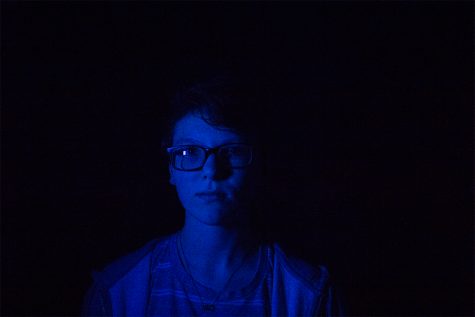Living through
Only living to survive another day
Senior John Adams struggles with depression. This illness invades life and can make daily tasks difficult to work through. “To me, mental illness is an obstacle, but I try extremely hard to fight against it. It feels very suffocating at times, but I have to tell myself that pain is never permanent,” fellow senior Allie Kirkpatrick said.
A completely dark room, a bed torn apart with sheets, trash and tissues strewn about. A sole person, shriveled alone in his bed. This is what depression looks like.
No, that is not what depression looks like.
A brightly lit room filled with inviting friends and vibrant colors, mimicking the actions and laughter amongst his friends. Not in the dark, not alone, not crying; instead, he is surrounded by those who should make him happy, in an environment that should be lively. But something isn’t right. It has never really felt right for senior John Adams.
Adams has been plagued with depression, anxiety and suicidal thoughts for several years, and every day in between has been a continuous and exhausting uphill battle, a war between the two extremities within his own mind. Adams is constantly fighting himself and his mind in hopes of coming out alive.
“I just kind of live in order to cope. I live as a different person, I just throw who I am and my real thoughts away. I become a different person completely so that my brain doesn’t have mental illness. It is literally like I am someone else in my body,” Adams said. “[Depression] has prevented me from having a lot of fun. There have been times where I have been sitting there with people, they’re having a blast and I am acting like I’m having fun, but I’m not. I’d just rather sooner be at home, alone.”
Disguising his true self, displacing his raw uncensored thoughts, and masking his genuine emotions is much less painful than embracing his demons and coming to terms with the fact that he is suffering from a mental illness.
“[Mental illness in one word is] lost. You never really feel like you are who you are and you never really feel like you’re around,” Adams said.
Alone, absent and afraid, Mabelle Dooley* is all too familiar with feeling lost, as she has suffered from severe anxiety and depression her entire life, leaving her prone to slipping into depressive episodes for hours, weeks or even months at a time without warning.
“Oftentimes, a depressive episode for me could be characterized as nothing. I’m talking literally do nothing. There’s no thoughts, there’s no actions,” Dooley said. “I’ve spent hours upon hours blankly staring at the wall opposite my bed. Oftentimes, this can lead to the suicidal thoughts. It’s a process of, ‘Why am I like this?’ ‘No one could like me,’ then I might slip into a PTSD attack, which in the past has resulted in me staring into a mirror with a knife to my throat telling myself, ‘Everyone would be better without me.’”
This numb, almost catatonic state leaves Dooley feeling helpless as it generates doom, sorrow, and pain—which, unfortunately, have become her norm.
“[Mental illness], in my opinion, [is] impossible. It feels impossible to talk to people and for them to understand. It feels like it’s impossible to ever see a future where I could be happy and normal,” Dooley said.
Guidance counselor Mr. Kristopher Miller attests to the strangling effects of mental illness and the way in which its disconnected effects leave the student drained of motivation and hope, deeming things impossible.
“When you are so agitated with anxiety you can’t get stuff done, you just keep looking at the same side [of things] and you’re like ‘I don’t know how to do this’ or ‘I don’t know what to do.’ Or, you know, with depression, you don’t want to do things, you don’t want to go, you just want to go home and sleep,” Mr. Miller said. “To think, ‘I have to deal with [mental illness] and try to keep up with everything that everybody else does and try to keep it together, it’s hard. It’s really hard when your brain turns against you.”
The overtiring effect mental illness can have on everyday actions reaches across the board, creeping into each victim’s life in some way or another, almost isolating them from everything around them, according to Dooley.
“I don’t know if having depression necessarily makes my life more tiring, but it definitely feels like it. I can watch people do the same thing I am, but they’re happier and I wish I could be like that,” Dooley said. “It’s a struggle some days to come to school and do the expected work. Some days, moving and thinking and living just seem like an impossible task, even if on normal days it’d be considered easy.”
Mental illness leaves Adams unable to shake this depersonalized feeling and finds himself immobilized as he is only able to see his illness, his “weakness,” rather than himself.
“It just affects how you think, so you’re never really having the same thoughts as everyone else and you’re never really able to be in the moment,” Adams said. “I think it makes me weak. I didn’t want to accept that I had a mental illness, because, yeah, it’s a feeling of weakness.”
Even while carrying these feelings day to day, victims often hope to do all they can to avoid letting it be known they are struggling to avoid scrutiny, judgement, and bias — all of which feed into the cycle of mental illness, according to Mr. Miller.
“There’s such a stigma about mental health, which I hope is dissipating, but it’s still there, and people don’t like to be seen as somebody that has a problem. Our society, our culture, believes that if you don’t have it all together, you’re a failure.” Mr. Miller said. “You don’t want to be that person that struggles and has a hard time with anything because if you do, then you’re weak, and if you’re weak, then you’re never going to amount to anything. And we can’t just accept the fact that we as humans, we all have faults, we all have struggles, and that reinforces the idea that I’m not good enough, especially with depression.”
While some may think of mental illness as a freely moving state or temporary feeling, senior Allie Kirkpatrick disagrees entirely, describing it as something you take with you everywhere you go, dipping its foot into every corner of your life.
“I don’t do a lot of things because of my anxiety. It makes me just not want to do anything really, like I just feel like staying home where I know I will be ‘okay,’ I guess,” Kirkpatrick said. “I think a lot of the times you just feel stuck, like nothing will ever change.”
Even though it appears easy to recognize that feelings and symptoms of mental illness are not healthy and should be eliminated and worked on, moving forward past this realization is far more difficult than it seems, instead of being an easy flip of a switch, according to Kirkpatrick.
“[Mental illness] heartbreaking or stuck. I say this because there’s so much hope in my heart [to recover], yet sometimes, I can’t seem to transfer that hope into my thoughts and actions, no matter how badly I want to,” Kirkpatrick said.
Though mental illness is an illness of the mind, it is not all in the head, it is not just a mental game; it inserts itself causing medical problems, issues in connections and even impaired functionality. Kirkpatrick had gone to the doctor for alarming heart rates, shortness of breath, and nausea, but left being told it was all due to her anxiety.
“I went to the doctor for a checkup and then we told her about my racing heart and anxiety … for me, my heart beats super fast [when I have an anxiety attack] and I have irregular heart beats and feel like I can’t breathe and my lungs are constricting. I had been to doctors before to see if it was a condition or not,” Kirkpatrick said. “I had an echo test done on my heart to see if I had a heart disease that runs in my family or maybe something else… I also had blood work done to check my iron levels to explain things, but they were all relatively normal. It’s all just because of my anxiety.”
Adams is held captive by his depression as it continues to bring his life to an unprecedented, alarming stop.
“[Depressive episodes] actually lead to the suicidal thoughts [for me] because your brain just wants to stop, it wants to stop thinking, you just want to be done. You feel completely alone all of a sudden; it doesn’t matter if someone is literally letting you cry on their shoulder, you feel alone,” Adams said. “It’s like this falling feeling of falling away from everything that you have, and then you feel like nothing you have or had was ever real; people who say they care about you don’t.”
Panic attacks are just as detrimental, according to Adams, as they can manifest into a debilitating force and prevent someone from living freely, from feeling under control, from happiness.
“A panic attack is just scary. It is just a full body fear. It’s so much different from when you get pulled over by the cops because there is no imminent danger, there is just a fear… with a cop you’re afraid you’re going to get a ticket, but with a panic attack, you’re just scared [of everything],” Adams said.
Above all else, mental illness plagues Dooley by leaving her helpless, drained, and hopeless; longing for a better life, a life in which she feels alive.
“I don’t really know, for me the hardest part might be the inner debate of, ‘Why do I have to feel this?’ Many tears have been shed over the thoughts of, ‘I might never be happy,’ and I question, ‘Why can’t I just be normal?,’ ‘Why can’t I just be happy?’” Dooley said.
Despite the agonizing weight of mental illness day in and day out, the seemingly never ending battle, and the painful effects, it is possible to live on and get past it, no matter how grim the chances seem. Mr. Miller concurs and hopes every student knows whatever they are struggling with, whatever they are experiencing, it is validated, they are heard, and they are cared for.
“Every student is worthwhile and they are worth that time that we all spend with them to try and get better,” Mr. Miller said. “You are not alone, and, with time, this will get better. Mental illness is not a death sentence, it is not a sentence to failure.”
Dooley believes that while mental illness is a topic of discussion in nearly every health class or long talk with a guardian, it is not always seen as important as it is.
“As many of us who took middle school health can tell you health is a pyramid and without one side this pyramid the triangle will fall. Mental health is one of those sides but it’s the one you have the least control over. You don’t decide to struggle, you don’t decide to have a difficult inner conflict, you don’t choose to go through situations that cause PTSD, you don’t cause mental illnesses,” Dooley said. That’s why it’s so important that people who feel like this and struggle get help. Your mental health matters just as much as your physical. Ask for help, don’t just assume you’ll be okay. This is no way to live, and a part of you knows this. There is no shame in not being okay or asking for help.”
Even with the immense power that mental illness holds over someone, Kirkpatrick wants those struggling to know there is a light at the end of the tunnel, and at the end of the day mental illness might have the ability to control someone’s life, but ultimately the control is with them.
“To me mental illness is an obstacle, but I try extremely hard to fight against it, it feels very suffocating at times but I have to tell myself that pain is never permanent. Living with mental illness is definitely very difficult but not impossible,” Kirkpatrick said. “Just because you have a mental illness, you are not any less worthy than anyone else. You are so loved and important. One of my favorite quotes is that ‘without you the world would not exist,’ I think when you are in a terrible mental state it can be hard to believe that, but it’s completely true. Without you, nothing would be the same. Tell somebody [if you are struggling,] whether it is a friend or adult or counselor, or text lines and hotlines that can help you…you’re never really alone even though you might feel like you are.”











